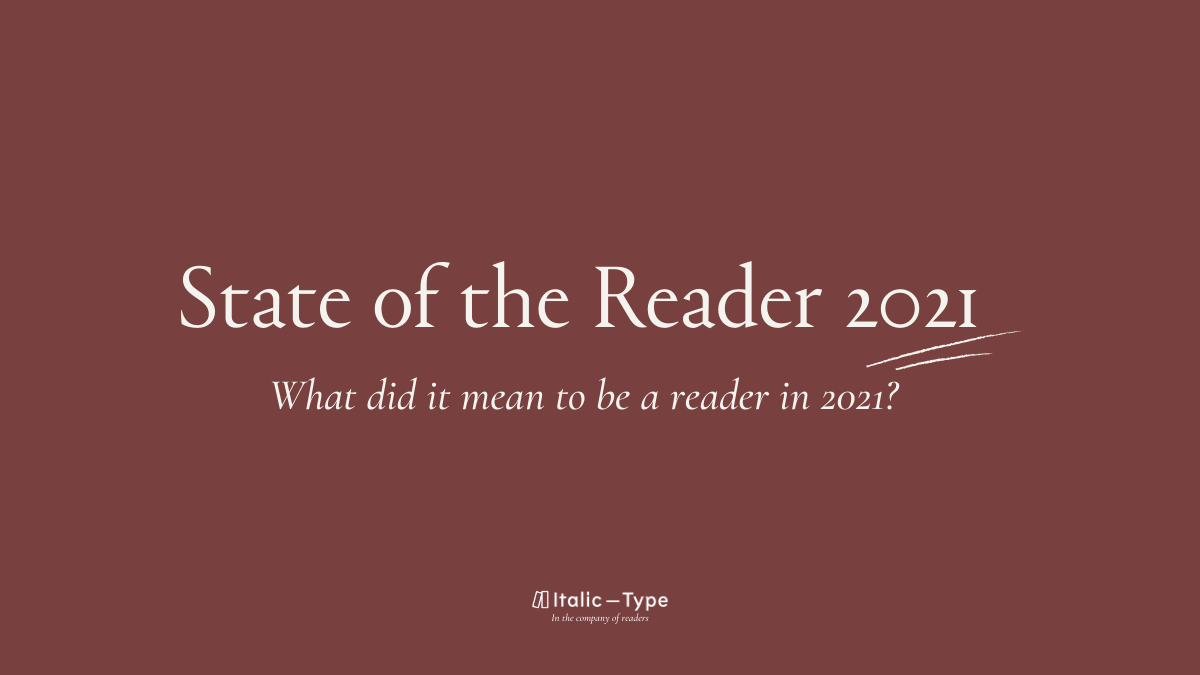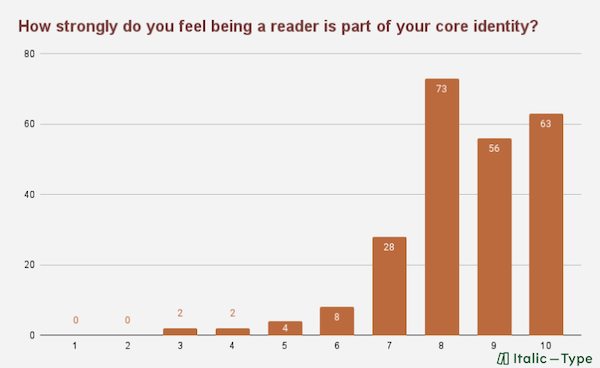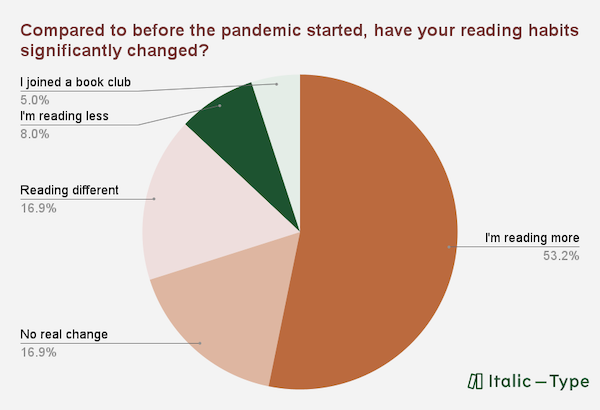State of the Reader 2021 Survey Results

In December 2021 we fielded a small, informal survey of readers. We wanted to know what makes readers tick. What do we love about reading? What do we struggle with? And how has the pandemic changed things?
Thank you to the 237 people from all over the United States, and all over the world, who participated!
Key takeaways:
- - Most readers articulated a specific value that reading brings to their life, most commonly citing either: alleviating anxiety, creating empathy, and learning something new.
- - While a majority of readers prefer reading physical books (70%), audio books were mentioned frequently as a newer format many readers got more into in the last couple of years.
- - Among a variety of methods readers have tried to help them read more books, readers have found success with tracking books (70%), followed by setting a reading goal (60%), and joining or starting a book club (33%)
- - Tracking books – keeping a list of books you want to read and have read – gives readers a sense of accomplishment, helps them remember what they read, lets them make more informed recommendations to friends, and helps them be intentional about an activity they highly value.
- - Over the course of the last two years dealing with the pandemic, most readers reported reading more in that time period. Just 8% said they were reading less.
- - Divisions emerged over the value of setting a numeric reading goal and participating in book clubs – with strong feelings for and against expressed on each front.
Dig in to learn more about how readers are building stronger habits, where they find book recommendations, and how they’re thinking about reading goals in 2022 (hint: more than just a number!)
Respondent Demographics:

- - We gathered 237 responses from readers, 86% within the U.S. and 14% from outside the U.S. Internationally, responses came from Canada, England, India, Mexico, Australia, South Africa, Portugal, and the Philippines.
- - Our sample skewed on the younger side, with 80% aged 21 - 36.
- - 97% described themselves as someone who loves to read. And over 80% felt strongly that being a reader was a very important part of their identity.
- - 60% spend time reading a book every single day! Followed by 22% 3x a week and 18% once a week.
- - 69% prefer reading physical books, 13% prefer Kindle or an e-reader, 7% prefer tablet or phone, and 7% prefer audio. Though audio didn’t rank high in terms of the preferred format, it was frequently cited as an element of “pandemic reading” and an area that many readers started seriously exploring for the first time.
- - 47% were very satisfied with how often they read. 34% felt good about squeezing reading in where and when they can. And 20% said they often felt bad about not reading as much as they would like to.
Why do people read?
We asked readers to get their poetic wax on to elaborate on why reading books is important to them. Why do we love it? Why is it something that we so strongly feel is tied to our identity?
The responses we received were thoughtful, eloquent, and inspiring. And in reading through over 200 responses, some common themes emerged.
Alleviates anxiety.
“It feels cleansing for my brain after a day of technology and distractions. It helps me relax and alleviates anxiety. “
“I've realized how much I depend on reading to regulate my brain. In the doomscrolling days, I began to notice that if I wasn't reading a book, my anxiety would spike and my attention would drop.”
"I spent all day looking at screens and processing information, generating ideas, explaining ideas – reading is the antidote to the demands of knowledge work. It forces concentration, it slows my brain down to a reasonable pace, it gives my eyes a chance to rest, it is an uninterrupted, end-in-itself activity that reminds me how vast human experience can be and gives me a slice of worlds I might never be part of. "
“In the age of distraction, reading is a form of meditation.”
Increases empathy / Helps you understand the world and people.
“I prefer reading books from authors not born in America as it's an incredible way to learn about new cultures, countries, etc. Reading has expanded my curiosity and empathy.”
“I'm a kinder, more empathetic person because of my reading life. I have learned so much about others through books, and I love that!”
“Unlike most other hobbies, reading has benefits that seem to sneak up on you. It doesn't happen all at once, but the more stories you read, the way you move about the world changes. Suddenly you're more aware of different cultures and perspectives, you're showing up more knowledgeably and empathetically in conversations. At first you may not even trace this back to the habit of reading, but it most certainly is tied to the travels you're making through the pages. It's really beautiful.”
Learning new things.
“I love learning new things. I mostly read non-fictions, so for me it’s about expanding my horizons and learning new things or more about things I already know.”
“I read history to enrich my knowledge of and experience of my world. It's what keeps me grounded and inspired professionally.”
Satisfaction and barriers to reading
Even though reading is something we love to do, and it’s a powerful and enriching part of our lives – many of us struggle with finding the focus, energy, and time to engage with books the way that we want to.
The things that get in the way are relatable to all of us – feeling tired and burnt out at the end of the day, the needs of family, and of course the siren call of an endless supply of TV shows and social media distractions.
Even still, 47% said they were satisfied with how often they read, and 34% said they were happy to squeeze in reading where and when they can in their lives. And 20% reported feeling bad they weren’t reading as much as they would like to be.
But across all three groups, even satisfied readers, there is still a tension. We live in a screen-fueled, distraction-prone world. Reading is often the cure, but overcoming barriers can be challenging.
“I'm tired at the end of the day, and I think although I read 5-6 days, I wish I read more often because I benefit so much from it.”
“I want to give reading my full attention when I do it, but that isn’t always possible.”
“Screens! On weeks when I don't read as much as I'd like it's because I've gotten sucked into my phone or a TV show.”
What has worked for people to help them build good reading habits?
The most popular method readers have tried to help them read more and build better reading habits is tracking their books – what they want to read and the books they have finished.
Setting a reading goal and joining a book club were also things many readers found to be beneficial.
Several other themes emerged about how people have found ways to read more and read better:
- - Finding a routine that works for you
- - Using audio books to help reading fit more seamlessly into busy lives
- - Don’t force yourself to finish a book you aren’t that into
- - Read what you want to read, not what you think you should read
- - Don’t be overly prescriptive about reading goals
Why is book tracking so effective and important for readers?
Almost 100% of respondents reported they track their books in some way, 23% use their own spreadsheet and 77% use an online tool like Goodreads, Italic Type, or StoryGraph.
- - It helps me remember what I loved, and I try to track who I lent books to.
- - To reflect back; to make recommendations to others;
- - Love to have it as a reference for myself to track my reading progress during the year, to look back on the kinds of books I read at certain points, to motivate myself to read more often.
- - Just started tracking and reading quantity and quality of experience have gotten much better
- - I like to keep a list of books I’ve read for a few reasons: 1. to remember which books that I’ve liked to recommend to others 2. research for my creative writing life 3. It makes me feel accomplished.
How are readers different? What works for some, doesn’t work for all
Feeling good about reading comes down to minimizing the aspects that make us feel overwhelmed, guilty, and despondent.
For some, social accountability is great! For others not so much. Some readers like to stick to a routine, others are more comfortable letting their mood dictate when and what they read.
Reading goals
While 70% said that having a reading goal was an effective way to help them read more, there was also a strong current of readers who found large numeric annual goals to be discouraging:
- - Having a book goal for the year. It just makes it feel like I’m failing if I don’t reach it 🤷🏽♀️
- - Reading goals don't really feel like positive reinforcement to me. It just makes me feel guilty about not reading as much as I could/should/set out to do.
- - Setting really lofty goals seems to have an adverse effect. Instead of being aspirational, it becomes daunting.
Many readers also found it important to not be too overly prescriptive about setting goals for daily or timed reading.
- - Planning it out. I tried to plot out how many pages I needed to read per day to finish a book in X amount of days and I found that having a plan with a timeline really killed my motivations and enjoyment of reading.
Book clubs
Book clubs are another place where readers express distinct preferences.
Here’s why some readers love it:
- - I love reading a variety and talking to others about it not just reading in solitude
- - I really love speaking with my peers about a book and seeing things they caught that I didn’t, and vice versa.
And here’s why some readers don’t:
- - The accountability and time structure makes it hard for me to enjoy the reading, I’d much prefer to go at my own pace.
- - Many readers also expressed their interest in participating in social book activity, but don’t have friends with similar interests, aren’t sure how to connect with a group they would like:
How has the pandemic affected reading?
The pandemic has effected every facet of life, and reading is no exception. In a world full of changes, how people read, when they read, and what they read also shifted in some surprising ways.

Overall, most people reported reading more and/or having more positive experiences. Just 8% of respondents said they were reading less. One of the things cited as a positive change was that many people explored audio books for the first time and found they helped read more.
Among the 52% who reported reading more, in addition to audiobooks, they elaborated by sharing that they are reading more "fun" genres, joining a book club, and starting to track books.
But even as people read more books some said that “they read more but are more distracted and less likely to finish” and another said “reading more, but the book recommendations she gets from social media where she spends a lot of time aren’t as enjoyable and she feels less satisfied."
On the other hand, almost half of the respondents who reported no change in the amount they read, reported higher levels of satisfaction and consistency by adopting new reading habits like starting a reading journal, tracking books, and paying attention to how much better reading feels than other ways of spending time.
People who reported reading less cited burnout / anxiety, book clubs disbanding, and especially not having a commute.
We can all relate to creeping burnout and how that makes reading challenging, even when it's something you love to do.
"My book consumption has slowly but consistently gone down over the past two years. I think being burned out on everything can make it harder to read, even when reading is something you love to do."
What are some goals readers have for 2022?
Way more than just a number of books to read. Readers have all sorts of different goals in mind for 2022. One thing the survey makes clear is that satisfaction with reading goes way beyond the quantity or amount one reads. Spending more time reading and feeling satisfied with your reading are related - but not the same thing.
Start talking to other people more about what I'm reading and what they're reading. I'd like my reading life to become more social.
I'd like to find the time to start a book club and/or more reading buddy moments.
Create better reading notes.
To deepen my reading experience by taking notes or starting a journal
To read books I purchased already before buying new ones
Commit to reading more physical books. It helps me invest in the story more.
Read more consistently every day because I know I would feel better and more relaxed if I did
Italic Type exists to help readers build stronger reading habits and learn, grow, and connect more with books. We exist to help readers develop the rich and satisfying reading practices we crave. We build technology for readers, because we are readers. And when you use Italic Type, know that you are in the company of readers.
